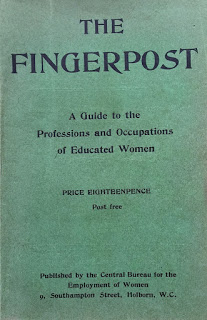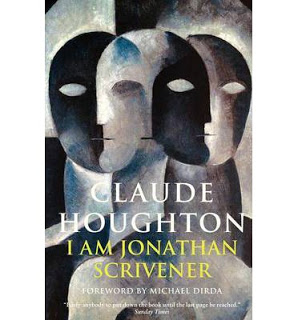
Found in The Fingerpost: A Guide to Professions for Educated Women, with Information as to Necessary Training (Central Bureau for the Employment of Women. 1906) an article called 'Literary Catchpennies' which outlines various scams played on would be writers of the time. Some of these scams, often for bigger stakes, are still with us on the web.
Literary Catchpennies
The perennial literary advertisement trick is, perhaps, the most specious of all. A "Publishing Firm" will offer to consider MSS. sent to Box so-and-so at the offices of the paper in which the advertisements appears. Or the advertisement asks for some specified requires a fee; sometimes he merely swallows all the MSS. sent to him and is heard of no more. A plausible gentleman, with an office in London, extracted from a struggling authoress of my acquaintance a fee of 10s. 6d. for the purpose of making copies of a little tale of hers for the American Press. Another required a specimen of already existing work as a "proof of competency," before employment. With wary caution a printed specimen was submitted, which was duly returned, with a word of approval and with an article taken from a Nonconformist journal - a sketch of some famous preacher - which the applicant for employment was required to paraphrase and return. This being done the MSS. apparently vanished into space for upon a visit of inquiry being made to the address mentioned in the advertisement, the advertiser's name was unknown! Again, a budding composer advertised for "Lyrics." A little poem on "Daffodils" was sent to him. After a weary wait, a gentlemanly young man called on my friend to explain that out of hundreds of lyrics though which he had waded hers was the only good for anything. He asked permission to set it to music and promised to pay a small sum - with many apologies for the smallness. A few days later came - not the small sum - but a tortured love song of Elizabethan or Stuart period. That is to say a phrase here and there was given with dashes in between. These gaps were to be filled up with suitable words. This curious piece of literary patchwork being done, it joined the Daffodil lyric - in oblivion. What budding authoress has not sent precious MSS. to advertised "Literary agencies" with timid hopes that the agent's joyful acceptance of them - together with the "unusual deposit" for "placing same" - will set her free on the first step of the ladder of fame. If the MSS. is "placed" the deposit may nicely counterbalance the price secured for the article plus the commission to the agency; or, more probably at some pains and after some delays the article may be rescued by the author - minus the deposit. Since, however, no author is entirely comment to judge of the selling value of his work, it may reasonably be supposed that a properly conducted literary agency could serve a useful purpose in introducing the budding author to his public. The unfortunate thing is that the budding author generally pays dearly before he discovers that the really bona-fide agency has little need to advertise daily in a score of papers for "suitable MSS."
Other pitfalls to unwary persons "who can write" are the advertisements offering prizes in competitions for more or less intricate word spinning. It is hardly necessary to utter warnings against these, for they appeal mostly to the enterprising speculative sort of person, in whom the gambling instant is not strictly suppressed. It may be noted, however, that "prizes" won in such conceptions seldom pay the competitor for the trouble involved in winning them. They certainly do not pay the genuine work seeker.
Fortunes to Order
Answers to much-advertised offers to teach the work seeker "How to make a fortune" generally result in the return of a fascinating booklet, detailing with the utmost gravity the "trade secrets" of some industry which is sure to be entirely foreign to the fortune seeker's taste or capacity. Two such treatises are before me; one has to do with allotment gardening and the other with pastry making. When all the "ifs" and "ands" are counted the reader comes to the conclusion that although the advertiser's experiences might be genuine a fortune would be much more quickly made by writing a similar booklet and selling it in thousands at 1s. or 1s. 6d., than by rolling out any of the precepts contained therein.




